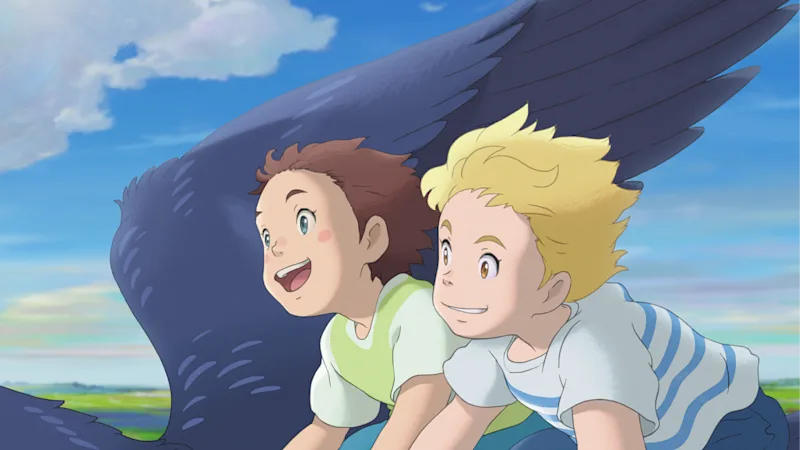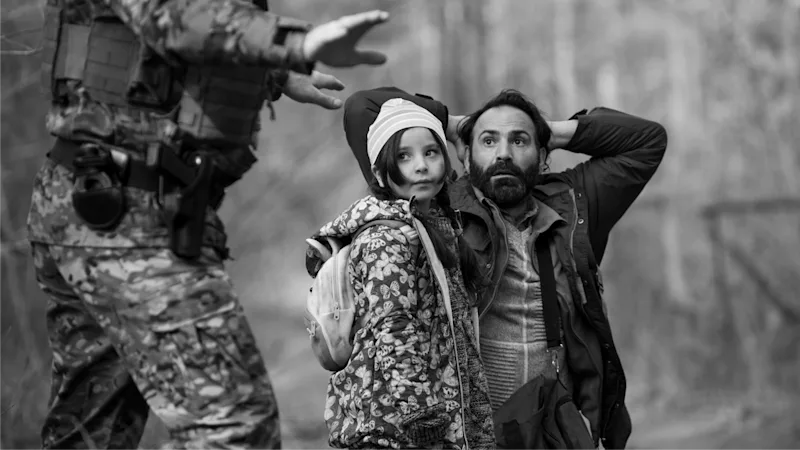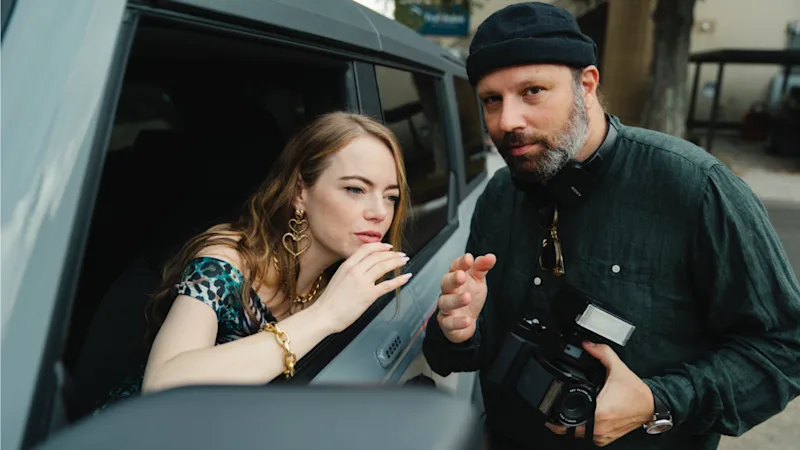Back in 2007, before Randall Park booked his breakout role in the ABC sitcom Fresh Off the Boat, before he earned his leading man bona fides with Always Be My Maybe (which he also co-wrote), before the actor joined both DC and Marvel's cinematic universes, he found his dream role in the pages of Adrian Tomine's graphic novel, Shortcomings: Ben, a self-sabotaging filmmaker who manages an arthouse movie theater, who is snobby, self-absorbed, and often unlikable — not at all like the roles Park would come to be known for. It's the sort of complicated and flawed character that has become a staple of a certain type of independent filmmaking, though rarely if ever have they been Asian-American.
More than 15 years later, Park would have the chance to direct Shortcomings as his first feature film. Like the graphic novel, the movie follows a trio of Asian-American millennials — Ben, his estranged girlfriend Miko (played by Ally Maki), and his womanizing best friend Alice (Sherry Cola) — as they navigate modern relationships, identity and belatedly coming of age. By the time Park got around to making Shortcomings, it no longer made sense for him to play Ben, and so he cast Justin H. Min in the role. "He played it better than I would've," Park laughs.
"Thankfully I've aged out of that, because it wouldn't have been good. I think what Justin brought was a real depth to the character and a real vulnerability that makes you lean into the character," explains the director (who appears in the movie in a small cameo role), "which is important because so much about the character will make you want to lean out. It's a very intimate performance, and there's so much depth to him as a person, but also to his approach to the character."
Shortcomings debuted earlier this year at Sundance — following in the footsteps of the films that inspired it — and also screened at Tribeca Fest, ahead of its release in theaters. "It's very much a dream come true in a lot of ways," Park says of the experience.
A.frame: Why was now the right time to direct your first feature?
I think in part because I had dabbled in directing TV, and I directed a lot of shorts and web stuff, and I felt like I was almost ready. But the fact that this story was available, that they were looking for directors at the time when I just so happened to inquire about this particular book and whether or not we might be able to make it into a movie, and then to find out that there was already a script written by Adrian and they were meeting with directors, it just felt like a sign that, at the very least, I needed to throw my hat into the ring. Because the graphic novel has meant so much to me since it came out. I had been thinking about this thing as a movie for that long because the book resonated with me so much. It all felt like, I don't know — kind of serendipity in a lot of ways.
Why almost ready?
I feel like it's like having a kid or getting married, those big life changes that you're never quite ready for. You just got to dive in. And it felt like there was always more to learn and more to know before going in. But the opportunity presented itself, so I felt like, 'You know what? I'll learn on the job and just stay as faithful to my vision and the actual text that Adrian wrote. I'll stay as faithful to it as possible.'

Returning to Shortcomings more than 15 years after you first read it, what still resonated with you that you wanted to capture on-screen?
Well, when I first read the book in 2007, I was so mesmerized by it and really blown away by it. It's almost cliché when people say 'I felt seen' by something, but I really did feel seen by his book, in the sense that it was such an accurate portrayal of the life of me and my friends at that time. It felt like there were conversations that were lifted from our actual conversations, and places that we would go and diners we would eat at. In that sense, it felt very authentic to me. At the time, I had never seen my life so accurately reflected back at me in any piece of art. It was a really, really a special feeling, and that feeling stuck with me all these years. Throughout my acting career, I'd always check in about this book. 'What's going on with this book? Why hasn't somebody made something yet?' During one of those check-ins is when I found out that I had an opportunity to possibly be a part of this, and somehow it magically worked out.
Did the benefit of 15 years change how you approached the material? Or your perspective on it?
I think so, yeah. The book was written back in '07, so there was a lot of work that we did on the script with Adrian, in terms of finding ways to modernize it, to make it feel of today. The thought was, 'Do we make this a period piece, or do we make it about today?' We felt like so many of the themes still apply to today, and it still felt so very real and modern in a lot of ways. Also, I just felt more knowledgeable about making movies. Through my career, working on movies as an actor, and working on TV shows, and seeing all different sets, and working with so many different directors, and seeing different directing styles, I felt more ready.
What were the most important tenets of a Randall Park set?
One of the first things that was really important to me when hiring all the department heads and assembling the team that would make the movie was to make sure that everyone was good at their jobs and everyone was professional, but also that everyone would make it a priority to be respectful and kind. That came up in every interview. I would bring it up. And so many of the people we ended up hiring, they'd be like, 'Oh, thank God you said that.' It really did make for a very harmonious set and a lovely experience, because especially with independent filmmaking, it can get very challenging, and there's so many unforeseen obstacles. There's a lot of natural stress built into the process, so for everyone to make sure to prioritize kindness, that really made for a great experience all around. I am proud of that — the fact that we hired such great human beings.
Leave the a**holery to Ben on-screen.
Yeah, exactly. [Laughs] Exactly.
I think people have been surprised to see this movie about an a**hole — as Ben is repeatedly called — from one of the least a**hole-y guys in Hollywood. How fun was it for you to push the boundaries of how unlikeable a character could be?
That was a tricky thing. Because you're sitting with this character throughout the length of a feature film. And for someone to be grating, and opinionated, and offensive the whole time, it would be easy to check out of the movie. Because it just doesn't feel good to have to sit with this type of character for that long. So, it was really important to me that we cast an actor like Justin H. Min, but also to shape a character that was very human, where you could really feel the vulnerability and the pain underneath that propels the behavior. And also, the charming sides of the character — his friendship with Alice, which is really the main relationship in the movie — making sure that we get why Alice is his friend. He's an extremely good friend. So, making sure that we see and feel these really human sides of him that make him identifiable. One of the reasons why I love the book so much is because I identified so much with Ben's flaws and Alice's flaws and Miko's flaws. I felt like I saw a little bit of each of them in me — and not the good sides of me, but the sides that I'm constantly working on, and I think the sides that we can all identify with to some degree.

One of Ben's big opinions is about what a movie like Crazy Rich Asians means to the community. [Shortcomings begins with a spoof of a Crazy Rich Asians-like movie starring Stephanie Hsu and Ronny Chieng.] Ben calls it a 'garish, mainstream rom-com that glorifies a capitalistic fantasy of vindication through wealth and materialism.' Miko argues it will open doors for other Asian-American filmmakers to make 'cooler' films that are 'more artsy or whatever.' Now that you've made this movie, do you side with her? Where do you fall in the debate?
Completely. I completely side with her in that. I see a connection between all of the great Asian-American projects that have come out as of late and those from before. I can see the direct line from a movie like Chan Is Missing to Better Luck Tomorrow to Shortcomings. And then also from Crazy Rich Asians to Shortcomings. I feel like they're all connected, and you wouldn't have Everything Everywhere All at Once without a Crazy Rich Asians. As different as the movies are, you need those big successes to break open the doors for us to take more chances, to do projects that are a little weirder or darker, or things that are a little more challenging. So, I totally side with Miko in that argument, but I also understand Ben. I understand Ben's feeling of having to like something just because you're of a certain race. That's totally a thing, not just in our community, but in all of our experiences in different ways. So, I get all sides of it.
How surreal was it for Stephanie to essentially play Michelle Yeoh's character after working together on Everything Everywhere All at Once?
I mean, for her to come out and do that for us, her and Ronny, it was just so great to even get them in the movie, because they're just such heroes to me and to the community.
As much as you could prepare ahead of time and as 'almost ready' as you felt, what was the biggest lesson you could only learn from directing your first movie?
Gosh, I didn't know to what degree we would have to be nimble and ready for really anything. With independent filmmaking, anything could derail a day. You could lose a location. You could lose an actor. Also, we were shooting during COVID, so you could lose key crew members. So, the skill of being nimble and positive despite any setback was a really great lesson from this film. I knew it would be a factor, but I didn't know to what extent it would be a factor. Being ready for anything was key, and seeing every setback as an opportunity to do something different, to quickly pivot and realize, 'Okay, this is taking me to a different place — an equally interesting if not better place.' Being ready for those gifts that come with every sucky thing that would happen.
When it feels like everything is going wrong and everyone is looking at you going, 'What do we do now?' how were you able to stay positive?
For me, it was really just about always staying positive, no matter what. Even if I don't feel it, to fake it til I make it type of thing. But to also really have faith that each of these unexpected things that would happen were challenges that could be met, and that there was always an answer somewhere in that moment of panic. There was always something that it was leading us to that, actually, more often than not. Became a gift to the project.
By John Boone
RELATED CONTENT:
Randall Park: 5 Films That Inspired My Directorial Debut
'Shortcomings' Composer Gene Back: My 5 Favorite Film Scores
Sherry Cola Hopes You're Enjoying the Summer of Sherry Cola (Exclusive)







